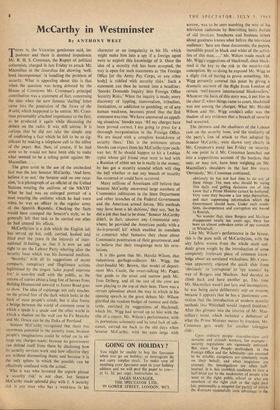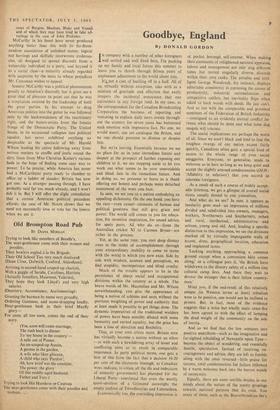McCarthy in Westminster
By ANTHONY WEST rTiliEllE is, the Victorian gentleman said, im- pudence and there is damned impudence. Mr. R. H. S. Crossman, the Rupert of political columnists, charged in last Friday to attack Mr. Macmillan in the Guardian for. showing 'well- bred incompetence' in handling the problem of security. What is appealing about this is that when the question was being debated by the House of Commons Mr. Crossman's principal contribution was a statement of fact, concerning the date when the now .famous 'darling' letter came into the possession of the News of the World, which happened to be untrue. Mr. Cross- man presumably attached importance to the fact, as he produced it again while discussing the debate on the radio. It was still untrue. It is curious that he did not take the simple step of confirming a fact which he felt to be so sig- nificant by making a telephone call to the editor of the paper. But, then, of course, if he had done so he would not have been able to make what seemed to be a telling point against Mr. Macmillan. . . .
The great artist in the use of the unchecked fact was the late Senator McCarthy. 'And here,, believe it or not.' the Senator said on one occa- sion, 'is a photograph of an official of the United Nations wearing the uniform of the NKVD.' What he had was an enlarged portrait of a man wearing the uniform which he had worn when he was an officer in the regular army of the Spanish Republic. Checking the facts would have cramped the Senator's style, so he generally left that task to be carried out after he had created his effects. '
McCarthyism is a dish which the English left has served up hot, cold, curried, hashed and fried over the years in the interests of inter- national ill-feeling, so that it is now an odd sight to see the Labour Party whoring after the security issue which was his favoured medium.
'Security.' with all its suggestions of secret compacts, conspiracy and illegitimate actions legitimised by the slogan 'mitts populi supreme' lex,' is sure-tire stuff with the public, as the success of stories about a long line of heroes from Bulldog Drummond onward to James Bond goes to show. The idea of espionage not only touches on the primal fear of the dark which lurks in the back of most people's minds, but it also forms a bridge between the world of common sense in which a spade is a spade and the other world in which a shadow on the wall can be Fu Manchu and Mr. Druce can be the Duke of Portland.
Senator McCarthy recognised that there was enormous potential in the security issue, because people's imaginations could be relied on to en- large any charges made; because no government can defend itself from them by disclosing how its security services work and how effective they are without dismantling them; and because it is the only sphere in which the possible can be effectively confused with the actual.
Who it was who invented the superb phrase 'a security risk' is not clear, but Senator McCarthy made splendid play with it. A security risk is any man who has a weakness in his character or an• irregularity in his life which might make him into a spy if a foreign agent were to exploit this knowledge of it. Once the idea of a security risk has been accepted, the way is open for such statements as "the Foreign Office [or the Army Pay Corps, or any other body] is riddled with security risks.' Such a statement can then be turned into a headline: 'Snooks Demands Inquiry into Foreign Office Security Risks.' When the inquiry is made, every discovery of tippling, transvestism, tribadism, fornication, or addiction to gambling, or of any human weakness, becomes proof that the first statement was true. 'We have uncovered an appall- ing situation,' Snooks says. 'All my charges have been proved correct. I am going to press for a thorough reorganisation in the Foreign Office. We are faced with a complete breakdown of security there.' This is the minimum return Snooks can expect from his McCarthy-type each- way bet. If he should happen to hit a Lesbian typist whose girl friend once went to bed with a Russian of either sex he is really in the money, he has got a security scandal which will ring the bell whether or not any breach of security has occurred or could have occurred.
Many millions of Americans still believe that Senator McCarthy uncovered large numbers of Communist infiltrators in the State Department and other branches of the Federal Government and the American armed forces. 'His methods may have been a bit dubious,' they say, `but he did a job that had to be done.' Senator McCarthy didn't, in fact, uncover any Communist any- where; he provided the American public with a 'do-it-yourself kit' which enabled its members to construct what fantasies they chose about Communist penetration of their government, and to believe that their imaginings were his reve- lations.
It is this game that Mr. Harold Wilson, that industrious garbage-collector Mr. Wigg, the clear-headed Mr. Brown, that model of deport- ment Mrs. Castle, the sweet-talking Mr. Paget, that guide to the strait and narrow path Mr. Toni Driberg, and all the rest of the crew are now playing to the top of their bent. There was a certain splendour about the way in which in his opening speech in the great debate Mr. Wilson glorified the random budget of rumour and tittle- tattle, enriched by suggestions of blackmail, which Mr. Wigg had served up to him with the title of a report. Mr. Wilson's performance, with its portentous solemnity and its total lack of sub- stance, carried me back to the old days when Senator McCarthy, with his eyes large with sorrow, was to be seen numbing the wits of his television audiences by flourishing hairy fistfuls of old invoices, brochures and business letters about goodness knows what before the television audience; 'here arc these documents, the papers, incredible proof in black and white of the activi- ties of this man....' Mr. Wilson made much of Mr. Wigg's suggestions of blackmail, since black- mail is the key to the risk in the security-risk conception. By so doing he exposed Mr. Wigg to a slight risk of having to prove something. Mr. Wigg presently covered this point by giving a dramatic account of the flight from London of certain 'well-known international blackmailers.' Whatever the basis of this story was, it put him in the clear if, when things came to court, blackmail was not among the charges. What Mr. Harold Wilson and Mr. Wigg couldn't offer was the shadow of any evidence that a breach of security had 'occurred.
The thinness and the shadiness of the Labour case on the security issue, and the similarity of the party's line, of attack to that adopted by Senator McCarthy, were shown very clearly in Mr. Cros.sman's essay last Friday on security. At one point in it Mr. Crossman launched out into a suppositious account of the burdens that may, or may not, have been weighing on Mr. Macmillan's shoulders in the last few years. 'Obviously,' Mr. Crossman continued, obviously he has not had time to do any of these things. The men who should be seeing him' daily and getting decisions out of him know' that a Prime Minister cannot be bothered. Very soon they become a law Unto themselves, and start suppressing information which the Government should have. Under such condi- tions, incompetence and corruption are bound to flourish.
No wonder that, since Burgess and Maclean disappeared nearly ten years ago, there has been an almost unbroken series of spy scandals in Whitehall.
Like Mr. Wilson's performance in the House, this is the pure milk of McCarthyism, with the airy fabric woven from the whole cloth sud- denly given weight by the introduction of some completely irrelevant piece of common know- ledge about an unrelated wickedness. Mr. Cross- man apparently enjoyed the quick slide from `obviously' to 'corruption' to 'spy scandal' by way of Burgess and Maclean. And decided to climb back and have another go. This time Mr. Macmillan wasn't just lazy and incompetent, he was being quite deliberately soft on treason, because it appears that he has a 'passionate con- viction that the introduction of modern security methods into Whitehall would imperil freedom.' After this glimpse into the interior of M r. Mac- millan's mind, which included a definition of what the Prime Minister means by freedom, Mr. Crossman gets ready for another toboggan slide: Upon ordinary people- -executive-class civil servants and aircraft workers, for example -- security regulations arc rigorously enforced. But since Top People—particularly in the Foreign Office and the Admiralty—are assumed to be reliable, exceptions are constantly made on their behalf; and when suspicions arc aroused, the investigations are often half- hearted. It is this snobbish readiness to turn a half-blind eye to the weaknesses of people 6ho went to the right public school or who are members of the right club or the right part [sic, presumably a misprint for party], of which the Russians successfully took advantage in the cases of Burgess, Maclean, Blake and Vassal' and of which they may have tried to take ad- vantage in the case of John Profumo.
McCarthy in his finest hour never produced anything better than this with its far-from- random association of unlinked names, logical red herrings and skilfully interwoven irrelevan- cies, all designed to spread discredit from a vulnerable individual to a party, and beyond it to a social class—a minority already regarded with suspicion by the mass to whose prejudices Mr. Crossman wishes to appeal.
Senator McCarthy was a political phenomenon greatly to America's discredit, but it gives me a great deal of pleasure to point out that he was a temptation resisted by the leadership of both the great parties. In his attempt to drag American politics into the gutter he was followed only by the backwoodsmen of the reactionary right, and the bunco-artists from the lunatic fringe of the Democratic Party. The United States, in its occasional collapses into political squalor, has never exhibited anything so despicable as the spectacle of Mr. Harold Wilson leading his entire following away from serious matters to snuffle and jostle round the dirty linen from Miss Christine Keeler's various beds in the hope of finding some easy way to power. To be precise, while America has never had a McCarthyite' party ready to clamber to office up a ladder of slander, Britain has now got one. As a stranger passing through, I have probably said far too much already, and I won't rub it in. But I will offer the slight consolation that a certain American political precedent affords; the case of Mr. Nixon shows that we need not necessarily love or vote for the lowest when we see it.







































 Previous page
Previous page